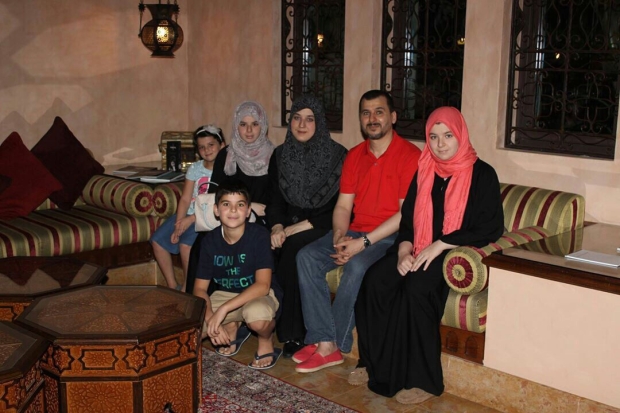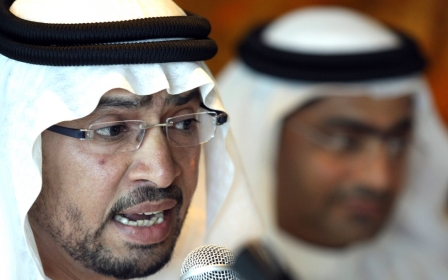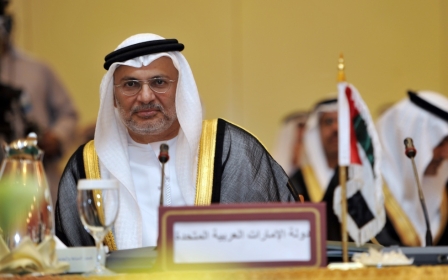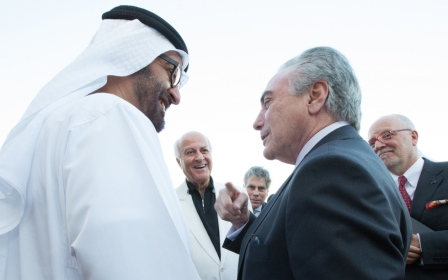A daughter’s struggle to free her father from a UAE jail
Salim Aradi has been held for more than 343 days without charge, without legal representation and without much-needed medical care
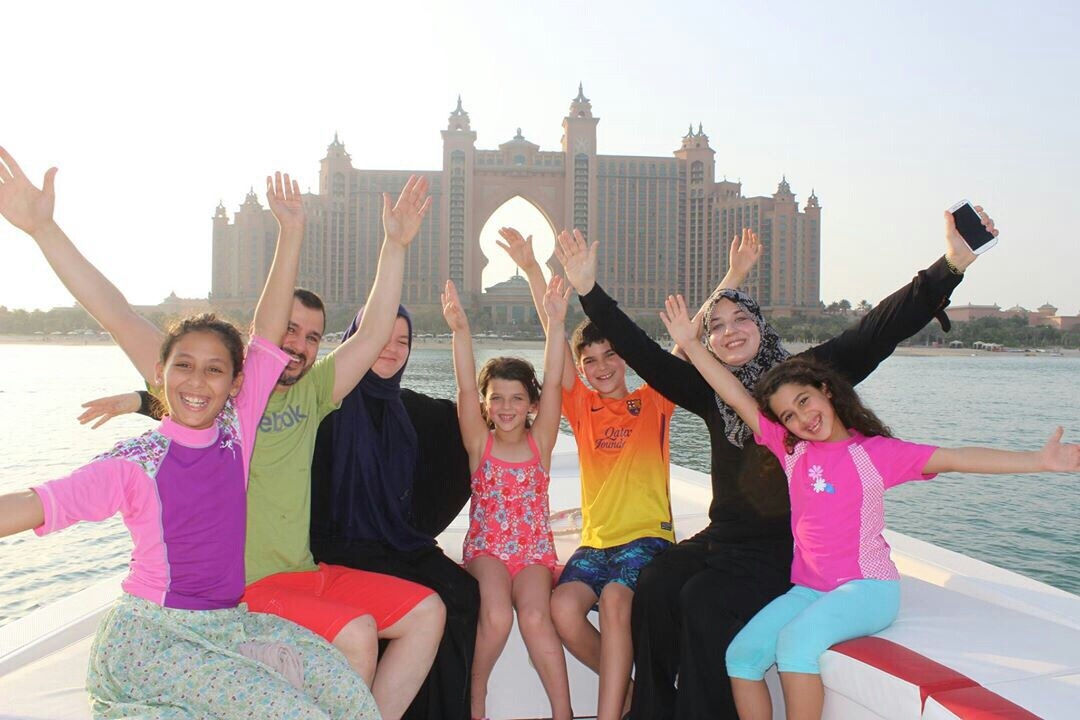
Salim Aradi and his family on holiday before his enforced disappearance in the UAE (Photo courtesy of Marwa Aradi)
Published date: 6 August 2015 15:21 BST
|
Last update: 9 years 3 months ago
Marwa Aradi is not like most teenagers her age. While other teens spend their time hanging out with family and friends and enjoying carefree, youthful pursuits, Marwa is on an entirely different mission.
Her primary occupation is to secure her father’s release from a United Arab Emirates jail where he has spent more than 343 days without charge, without trial, without legal representation and without much-needed medical treatment.
At 17, Marwa is the oldest of five children, Nur, 14; Mohamed, 12; Rayhana, 7; and Yasmin, 3. As the big sister, she sees it as her role to help bring their father, Salim Aradi, home.
As part of her campaign to free Libyan-born Aradi, Marwa has set up a website, Facebook page, Twitter page, YouTube channel and regularly pens earnest letters to journalists asking them to report on his case, all to raise awareness of her father’s plight.
That plight is the stuff of nightmares.
Aradi, a Canadian citizen, moved from Vancouver to the UAE in 2007 to expand his home appliances business. Life was relatively peaceful and uneventful according to Marwa, and there was no reason for him to have come to the attention of the security services.
On 28 August 2014, however, the Aradis were on a family vacation when, at midnight, Salim was called down to the reception of the hotel they were staying in for a “chat” with state security services.
That was the last his family saw or heard of him for the next two months.
Despite desperately trying to find out what had happened, where he was, and if he was even still alive, for the first 60 days after his disappearance the UAE authorities denied he was being held at all.
Finally, two months and nine days after he was taken, his family received a two-minute phone call in which he was able to let them know he was alive.
Another month passed before anyone from the Canadian Embassy was allowed to visit him, and even then they were only allowed to see him at a distance, to confirm his identity. The Aradi family believes this may have been in order to hide signs that he had been tortured.
Aradi was arrested around the same time as 10 other Libyan businessmen, including his brother and business partner, Mohamad Aradi, but four of them – his brother included – were released in December 2014, without having been given reasons for their detention or release.
The four released Libyans recently issued an official statement supporting Aradi.
“Despite the brutal torture and oppression, the enforced disappearance in secret prisons in the UAE, and despite the consequence of health and psychological problems and considerable material losses… we continue to appeal for the calm and diplomatic resolution of this problem and for the release of the remaining Libyan nationals who are still languishing in prison,” the statement said.
They called on the Libyan government and the international community to help secure the freedom of those still being arbitrarily detained.
Still no legal representation
Aradi has never been charged with a crime and, under the UAE’s convoluted and opaque legal system, this means he is not entitled to legal representation. Even now, after more than 343 days of incarceration, he still does not have a lawyer.
“From the first day of our ordeal we’ve been unable to find a lawyer who will take the case,” Marwa told Middle East Eye.
“Because no charges have been issued, local lawyers have informed us that they cannot assist with legal counsel because they cannot defend him until he is part of the judicial system. This has been a very difficult task – we have approached many lawyers.”
Drewery Dyke, a researcher from Amnesty International, confirmed that this is the case. He told MEE that Aradi is considered to have been “subjected to enforced disappearance, a crime under international law, without any access to the outside world”.
Drewery also confirmed that Aradi “has not been charged and has had no access to a lawyer through whom he may have been able to meaningfully challenge his detention”. In any event, Drewery added, “very few lawyers would be willing to take this case on”.
“The UAE authorities have harassed, intimidated and imprisoned many human rights defenders in recent years, so very few lawyers are now willing to defend people arrested by the country’s state security apparatus,” he said.
As an example, Drewery cited the case of prominent human rights lawyer Dr Mohammed al-Roken who was himself detained in 2012, along with 93 others, and “handed down a grossly absurd 10-year prison sentence” and is now a “prisoner of conscience” who should be “immediately and unconditionally released”.
“With precedents like this,” said Drewery, “it is no surprise that no lawyer would be willing to take on Salim al-Aradi’s case. But they may use a ‘get out’ by saying that they cannot represent him for reasons of a lack of charge.
“The real reason is intimidation and fear.”
This lack of confidence in the UAE’s justice system was also echoed by Radidja Nemar, of Al-Karama, a human rights organisation based in Geneva.
Nemar told MEE that the group has had several cases of lawyers who have been “tortured and punished by heavy prison sentences simply for doing their job and defending victims of torture and arbitrary detention in their country”.
Lawyers themselves are increasingly “reluctant to take on cases of individuals arrested by the State Security Services simply because they fear for themselves… they basically risk going through the same thing,” she added.
Beyond that, even if Aradi could secure a lawyer – which is his right under international law – it is not clear how much practical help that lawyer could actually provide. With no charges, no prosecution file to see and no judicial process being adhered to “a lawyer would have virtually no capacity to act and no room to argue”.
Aradi has been placed in “legal limbo”, Nemar said, and he is not the only one.
“This practice is very characteristic of the UAE Security Services... the case of Mr Aradi is far from being isolated.”
Why is he being put through this?
More than 340 days after his disappearance it is still not clear why Aradi is being held.
As the family insist there is no question of him having actually committed any sort of crime, the assumption is that he is being held for political reasons.
When asked by MEE whether Aradi is a member of the Libyan Muslim Brotherhood, which is considered to be a terrorist organisation in the UAE, Marwa says this is not the case.
She states that he is not a member of the Brotherhood or any other political organisation, although he has one brother, Abdulrazag Aradi, who was involved in an Islamist party in Libya.
She thinks there might be a “possibility” he is being held simply for the link to his brother.
Nemar also suggests that Aradi’s detention is politically motivated.
“His arrest seems to fall in a larger context of a policy of the UAE State Security apparatus to harass and punish all those they consider to be against their political interests in the Arab region,” he said.
“The UAE have been active in trying to curb protests that emerged from the Arab Spring.”
It is also telling, she says, that all of the Libyans arrested in the UAE, including several businessmen, have primarily, if not exclusively, been from the western part of Libya which is where the UAE targeted their airstrikes since August 2014.
According to Nemar, these arrests and detentions are “clearly motivated by a will to harass and punish people who are considered by the State Security as opposing the UAE policies in their home countries.
“Whether or not the individuals are indeed criticising UAE policies or whether or not they are politically engaged does not matter that much to the authorities. If the UAE were being said to be ‘sending a message’, then according to all the cases I have seen, this message would be ‘if you don’t align yourself with us, your people won’t be safe in our country’.”
International pressure – What next?
In terms of what sort of international pressure can be brought to bear on the UAE now, Drewery explains that it is a difficult situation since the UAE “routinely ignores appeals made by the UN or international human rights bodies and there are no domestic mechanisms by which government action can be held to account.”
“Aradi’s family really has no other place to turn save the government of Canada,” he said. “In light of all this, it is not at all clear to me what the Canadian authorities have done, or if they have been stymied in their attempts to truly support Salim al-Aradi.
“If they have been stymied, given the sensitivities of diplomacy, we would encourage the Canadian government to raise its frustrations with the UN or enlist third country support, such as EU member states, and they should support the family in pursuing other avenues of action.”
The family is continuing to try all possible paths and currently there is a complaint procedure at the Working Group of Arbitrary Detention of the United Nations that was launched on behalf of the Aradi family.
Asked if there was much hope that this will lead to his release, Nemar responded that “unfortunately the UAE government is not very responsive even to UN requests to respect basic human rights standards that they agreed to by being a State Party to the Convention Against Torture, but also as a member of the Human Rights Council.”
Health
Aradi’s deteriorating health condition is a major concern for his family. Marwa said her father is suffering from several ailments, some pre-existing and some brought on as a result of his treatment in prison, including asthma, high cholesterol, vulnerabilities due to past open-heart surgery, back conditions, major weight loss, recurrent eye infections and bronchitis.
The Canadian authorities have also reportedly told the family that they are seriously concerned about his health after seeing him in a recent visit.
According to Marwa, the prison recently reduced his meals to one per day which consists of three dates, a piece of cheese and a loaf of bread.
Marwa is also concerned about the level of psychological torture being employed, saying that when he last spoke to his family Aradi told them he had been led to believe that his mother was dead.
A family left scarred but not broken
The impact this ordeal is having on the young Aradi family has been devastating.
“Every day that passes without our father seems like years. All we can think about is his situation, his health, how he is being treated, and that haunts us all,” Marwa said.
“The absence of my father has left a scar on our hearts. He was an ideal father and despite all the pressure he was going through at work, he would never deprive of us of his time and would sit with us and listen to us and give us advice.
“My father’s absence is teaching us the patience and courage we need to get him out of this dark tunnel.
“I remember him telling us on our last vacation together ‘honesty leads to goodness’. We mean everything to our father and he did everything in his power to protect and take care of us but now it’s our turn to try and protect him.”
Requests by MEE for comments went unanswered by the UAE's London embassy as well as the Canadian Embassy in Abu Dhabi, and no response had been received at the time of publication.
New MEE newsletter: Jerusalem Dispatch
Sign up to get the latest insights and analysis on Israel-Palestine, alongside Turkey Unpacked and other MEE newsletters
Middle East Eye delivers independent and unrivalled coverage and analysis of the Middle East, North Africa and beyond. To learn more about republishing this content and the associated fees, please fill out this form. More about MEE can be found here.


